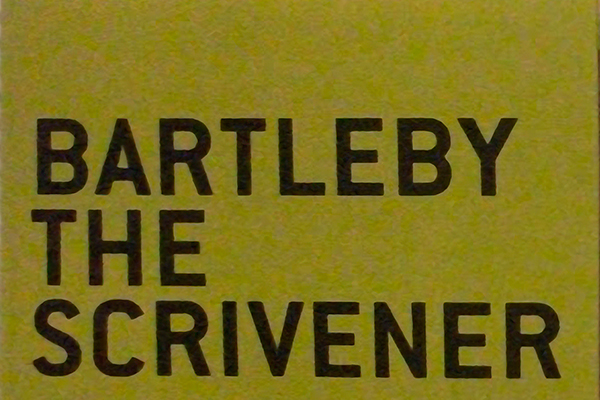A review, an outro; a comedy: Melville’s Bartleby
Author: Herman Melville
Bartleby was a quiet worker — painfully so. However, his work was good and legible. He worked at a small desk in the corner of the office and kept pace with his work better than either of the other scriveners in the office, who were both eccentric and could only put in a half day of work before losing their tempers or staining their work with blotches of ink.
One day, without looking up from his desk, the old lawyer held out a piece of work that he wished Bartleby to copy. When he demanded that Bartleby do the work, the young man politely replied, “I’d prefer not to.” The old lawyer was taken aback; it had possibly been years since anyone had even mumbled the word “no” to him. This refusal threw the lawyer into a fit and he asked why, but Bartleby said that he preferred not to give him an answer.
The next day, the lawyer asked Bartleby to do something else for him, but again the strange young man replied, “I’d prefer not to” before walking back to his desk.
As time wore on, Bartleby did less and less. The old lawyer used sympathy, anger, anything to make the young man work, but soon Bartleby did not do any work at all. He would stare out the window, at the black brick, as if he were looking out onto an ocean, or some other captivating vista. He was asked to leave, but he preferred not to, and stayed.
The lawyer came in one weekend and found Bartleby in the office. He said that this would just not do. Bartleby was kicked out, but he lay on the doorstep to the office, below the skylight, and waited there, as if to die, like there was nowhere else to go. Out of pity the old man let him back in, but shortly afterwards he moved offices and left poor Bartleby alone in the empty chamber - he could be someone else’s problem now, the old man thought.
But soon he heard that the new tenant of the chamber was to have Bartleby arrested. The old man pleaded with Bartleby to leave, to come with him, to go anywhere to avoid arrest for trespassing. “I’d prefer not to.” Bartleby responded.
In prison he refused to eat. He did not exercise. The old man paid the grub-master to make sure that Bartleby was fed - he paid handsomely for this, but to no avail; Bartleby looked awful. And the last time the old lawyer saw the scrivener, he was a wasted body, crouched and on his side beside a giant brick wall used to keep the city safe from its criminals - a wall not too dissimilar from that which stood outside the window of the lawyer’s old legal chambers.
Bartleby died.
At the end of the story, it is made known by the narrator that Bartleby used to be a subordinate clerk in the Department of Dead Letters in Washington DC, where he was suddenly moved by a change in administration. “For by the cart-load they are annually burned. Sometimes from out the folded paper the pale clerk takes a ring: — the finger it was meant for, perhaps, moulders in the grave; a bank-note sent in swiftest charity: — he whom it would relieve, nor eats nor hungers any more; pardon for those who died despairing; hope for those who died unhoping; good tidings for those who died stifled by unrelieved calamities. On errands of life, these letters speed to death.
Ah Bartleby! Ah Humanity!”
Smile and nod and the job market will accept you with open arms, class of 2012.







